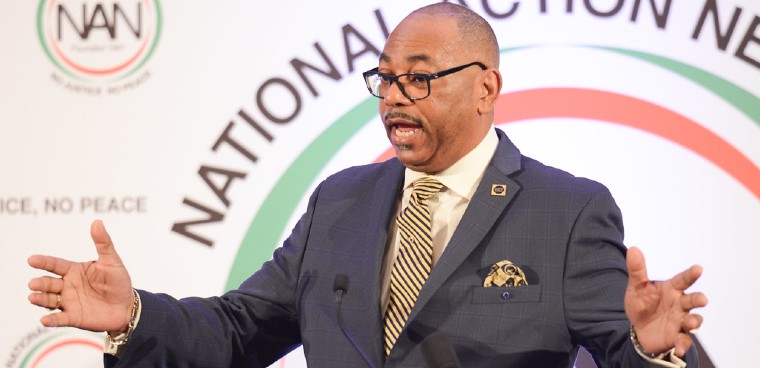AFGE looks to maximize two years of Democratic control on Capitol Hill
Although workplace safety is top of mind, the American Federation of Government Employees wants Congress to pursue action beyond the reversal of Trump workforce policies.

Everett Kelley receives an award at the annual National Action Network Martin Luther King Jr. Day Breakfast, Jan. 2019. (Photo courtesy: AFGE)
The largest federal employee union is pressing for some legislative wins with Democrats in charge of both houses of Congress and in control of the White House.
The top priority is ensuring safe working conditions during the pandemic and the provision of COVID-19 paid sick leave benefits for feds, said American Federation of Government Employees National President Everett Kelley during a Sunday press call. But the union also has a long list of other priorities.
"We must operate as if two years is our window of opportunity," he said during a plenary session held as part of the union's annual legislative and grassroots mobilization conference.
AFGE is hoping to see the passage of a 3.2% pay raise for federal employees as part of a bill introduced again this year by Rep. Gerry Connolly (D-Va.), who chairs a key House subcommittee with authority over federal workforce policy.
The union is also hoping for the passage of a bill that would expand the workplace rights of Transportation Security Administration workers; the repeal of legislation that allowed for more outsourcing of care by the Department of Veterans Affairs and another bill that makes it easier to fire VA employees. AFGE is also looking to roll back retirement cuts made in 2012 and 2013, Kelley said.
Finally, AFGE is hoping that Congress will "plug some of the holes" that allowed Trump to issue a series of 2018 orders by passing a federal worker bill reinforcing due process and collective bargaining rights, Kelley said.
The virtual session also hosted comments from a roster of congressional Democrats, who outlined their own federal workforce priorities.
"I bring you a very different message this year from last," said House Majority Leader Steny Hoyer (D-Md.). "No more defense. We're going to be on offense."
He voiced his commitment to expanding paid leave options for feds, referencing a paid family and medical leave bill he and other Democrats introduced with the Chairwoman of the House Oversight and Reform Committee, Carolyn Maloney (D-N.Y.) in January.
He said that he looked forward to bringing that bill to the floor during this Congress.
Senate Majority Leader Chuck Schumer also talked about his commitment to "to finish the job of ensuring that federal employees receive paid parental leave."
Re-opening bargaining to remove Trump-era policies from contract agreements is also a priority, Kelley said.
Federal employee unions are waiting the Office of Personnel Management to issue directives to agencies on the implementation of President Joe Biden's executive order that reversed a series of workplace policies put in place by former President Donald Trump.
In January, AFGE officials said on a press call with reporters that agencies were being slow to implement the Biden executive order, which instructed agencies to reverse actions taken related to the 2018 orders "as soon as practicable."
Not all agencies have new Senate-confirmed officials in place yet, but the union is still reaching out to agencies about implementing the order, said Jackie Simon, AFGE's policy director, told reporters. The union has also been working with OPM itself in writing the implementation of the guidance, which should be "imminent," Simon said.
Union officials have been stressing their interest in the creation accountability measures for agencies to implement the executive order, Simon said.
"There's definitely going to be some resistance [among agencies]. That's why we're pushing so hard for accountability measures for implementing Biden's executive order," Simon said. "We want the Biden administration to be just as aggressive in enforcing its executive order as Trump was in enforcing his."
NEXT STORY: Manchin's opposition could sink OMB nominee






